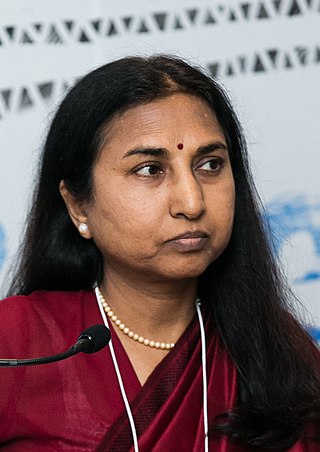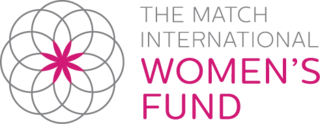Women's health differs from that of men's health in many unique ways. Women's health is an example of population health, where health is defined by the World Health Organization (WHO) as "a state of complete physical, mental and social well-being and not merely the absence of disease or infirmity". Often treated as simply women's reproductive health, many groups argue for a broader definition pertaining to the overall health of women, better expressed as "The health of women". These differences are further exacerbated in developing countries where women, whose health includes both their risks and experiences, are further disadvantaged.
Gender equality, also known as sexual equality or equality of the sexes, is the state of equal ease of access to resources and opportunities regardless of gender, including economic participation and decision-making; and the state of valuing different behaviors, aspirations and needs equally, regardless of gender.

Human rights in Uganda have trended for the past decades towards increasing harassment of the opposition, cracking down on NGOs which work on election and term limits, corruption, land rights, environmental issues, womens, children and gay rights. In 2012, the Relief Web sponsored Humanitarian Profile – 2012 said Uganda made considerable developments Since at least 2013 the Freedom in the World report by Freedom House has identified Uganda as a country considered to be "Not Free".There are several areas of concern when it comes to human rights in Uganda, and the "Not Free" classification is due to both low political rights and civil liberties rankings.

Melanne Verveer, born on June 24, 1944, in Pottsville, Pennsylvania, is the executive director of the Georgetown Institute for Women, Peace, and Security at Georgetown University. She also holds positions as a founding partner of Seneca Point Global, a women's strategy firm, and as a co-founder of Seneca Women. Verveer co-authored the book "Fast Forward: How Women Can Achieve Power and Purpose" with Kim Azzarelli.

Women of Uganda Network (WOUGNET) also known as Women of Uganda Network Development Limited is Ugandan non-governmental organization that aids women and women's organisations in the use and access of information and communication technologies (ICTs) to share information and address issues their concerns such as gender norms, advocating for their rights and building communities and businesses through education.

Bina Agarwal is an Indian development economist and Professor of Development Economics and Environment at the Global Development Institute at The University of Manchester. She has written extensively on land, livelihoods and property rights; environment and development; the political economy of gender; poverty and inequality; legal change; and agriculture and technological transformation.

The status of women in Bangladesh has been subject to many important changes over the past few centuries. Bangladeshi women have made significant progress since the country's independence in 1971, where women in the region experienced increased political empowerment for women, better job prospects, increased opportunities of education and the adoption of new laws to protect their rights through Bangladesh's policies in the last four decades. Still, women in Bangladesh continue to struggle to achieve equal status to men due to societal norms that enforce restrictive gender roles as well as poor implementation of laws that were set to protect women.

Women in Uganda have substantial economic and social responsibilities throughout Uganda's many traditional societies. Ugandan women come from a range of economic and educational backgrounds. Despite economic and social progress throughout the country, domestic violence and sexual assault remain prevalent issues in Uganda. Illiteracy is directly correlated to increased level of domestic violence. This is mainly because household members can not make proper decisions that directly affect their future plans. Government reports suggest rising levels of domestic violence toward women that are directly attributable to poverty.

Geeta Rao Gupta is a leader on gender, women's issues, and HIV/AIDS who is serving as United States Ambassador-at-Large for Global Women's Issues since May 2023. She previously served as executive director of the 3D Program for Girls and Women and senior fellow at the United Nations Foundation since 2017. She is frequently consulted on issues related to AIDS prevention and women's vulnerability to HIV and is an advocate for women's economic and social empowerment to fight disease, poverty and hunger.

Sarah Degnan Kambou is president of the International Center for Research on Women (ICRW), a global research institute that focuses on making women integral to alleviating poverty worldwide.
The Secretary's Office of Global Women's Issues is located within the United States Department of State. In 2009, Melanne Verveer was appointed to be the first Ambassador-at-Large for Global Women's Issues. From September 2013 to May, 2017, Catherine M. Russell was appointed to this position. From May 2017 through December 2019, there was no ambassador for this office. Kelley Currie, a political appointee, joined the Global Women's Issues Office as U.S. Ambassador-at-Large in January 2020. Geeta Rao Gupta is the current Ambassador-at-Large for the office as of May 18, 2023.

Females in Nigeria have a basic human right to be educated, and this right has been recognized since the year 1948 adoption of the Universal Declaration on Human Rights (UDHR) According to a report in 2014, female education has an important impact on the development of a stable, prosperous and healthy nation state resulting in active, productive and empowered citizens. Educating girls develop growth rates, encourages independence of the girl child and reduces social disparities. In 2009, the Nigerian Population Council (NPC) observed that women with higher educational qualifications are more likely to be in formal wage employment than those at the level of primary school education.

Gender inequality both leads to and is a result of food insecurity. According to estimates, women and girls make up 60% of the world's chronically hungry and little progress has been made in ensuring the equal right to food for women enshrined in the Convention on the Elimination of All Forms of Discrimination Against Women. Women face discrimination both in education and employment opportunities and within the household, where their bargaining power is lower. On the other hand, gender equality is described as instrumental to ending malnutrition and hunger. Women tend to be responsible for food preparation and childcare within the family and are more likely to be spent their income on food and their children's needs. The gendered aspects of food security are visible along the four pillars of food security: availability, access, utilization and stability, as defined by the Food and Agriculture Organization.
International Day of the Girl Child is an international observance day declared by the United Nations; it is also called the Day of Girls and the International Day of the Girl. October 11, 2012, was the first Day of the Girl Child. The observation supports more opportunity for girls and increases awareness of gender inequality faced by girls worldwide based upon their gender. This inequality includes areas such as access to education, nutrition, legal rights, medical care, and protection from discrimination, violence against women and forced child marriage. The celebration of the day also "reflects the successful emergence of girls and young women as a distinct cohort in development policy, programming, campaigning and research."
Ravi Verma is the regional director for the International Center for Research on Women's Asia Regional Office and leads the organization's local and regional efforts on various aspects related to research, providing expertise in building capacity and participating in policy dialogue on issues that include adolescent girls, reproductive health, HIV/AIDS, and gender-based violence.

Women's empowerment may be defined in several ways, including accepting women's viewpoints, making an effort to seek them and raising the status of women through education, awareness, literacy, and training. Women's empowerment equips and allows women to make life-determining decisions through the different societal problems. They may have the opportunity to re-define gender roles or other such roles, which allow them more freedom to pursue desired goals.

Women living in Myanmar continue to face barriers to equality. After forty years of isolation, myths about the state of women's rights in Myanmar (Burma) were centered around the conception that Burmese women face less gender discrimination and have more rights than women in surrounding Southeast Asian nations. After Myanmar opened its borders in 2010, gender discrimination began to be seen by the international community. Currently, a variety of organizations--both domestic and international--strive to educate people that this is a misconception to better make strides towards protecting women's rights in Myanmar.

MATCH International Women's Fund is a non-profit, non-governmental, grant-making organization created to make lasting changes in the lives of women and girls. Their company aims to support projects that dismantle barriers, change systems, challenge perceptions, and transform society and is based in Ottawa, Canada. MATCH is dedicated to funding women's rights movements and grassroots organizations working on women's rights worldwide with a particular interest in the global South. MATCH was founded in 1976 by two Canadian women, Dr. Norma E. Walmsley and Suzanne Johnson-Harvor. Since then, MATCH International has helped womens' rights organizations from numerous countries with investments totaling $12 million for improvement of women and girl's rights. In 2013, the organization re-launched under the name MATCH International Women's Fund with the same aim to invest in women and girls in the global South. As the only international women's fund in Canada, their motto is, "Holding Ground and Breaking Ground" on women's, girls', and transgender rights. The organization's funding comes from individual donors, corporate partners, and the government of Canada.
Jackie Asiimwe–Mwesige,, is a Ugandan human rights lawyer and philanthropy advisor. She is the current Chairperson of the East African Philanthropy Network (EAPN) and chief executive officer of CivSource Africa, a philanthropy advisory service company that she founded in 2017.
Grace Bantebya Kyomuhendo is a Ugandan professor of Women and Gender Studies, advocate for gender equality, social transformation and respect for women's rights. She is also a social anthropologist, feminist and social norms researcher and a lecturer at Makerere University. She and Marjorie Keniston McIntosh co-authored a book called Women, Work and Domestic Virtue in Uganda 1900-2003 which won the Aidoo-Snyder Prize.













